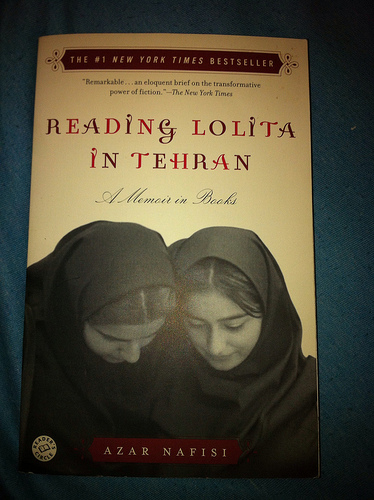
Literature Matters!
[flickr id=”8169867900″ thumbnail=”medium_800″ overlay=”true” size=”original” group=”” align=”none”]
In one of my classes this week, we read Fahrenheit 451, Ray Bradbury’s classic about a society that burns books and one man that dares to defy this. We wrote essays about the book, and as I was reading it, I thought of how simplistic the message of the book could be (it’s not necessarily this simplistic, but this is just one reading or one lens with which to look at the book). Basically, it’s that books and literature matter. And, for a reader and writer, this might be the only thing that matters to us. I couldn’t help but think of the following quote from Azar Nafisi’s memoir about daring to read literature in Iran after the Iranian Revolution, where many books were banned. This was a society where books were being burnt, just like in Bradbury’s world.
In the memoir, Nafisi puts The Great Gatsby on trial, as some of her extremist male students say that Fitzgerald and Gatsby, the character, would be killed if they lived in Iran. The only person brave enough to stand up for Gatsby and the book was a female student named Zarrin. Nafisi says this of Zarrin and the end of the trial:
“She said sometimes she wondered why people bothered to claim to be literature majors. Did it mean anything? she wondered. As for the book, she had nothing more to say. The novel was its own defense. Perhaps we had a few things to learn from it, from Mr. Fitzgerald. She had not learned from reading it that adultery was good or that we should all become shysters. Did people all go on strike or head west after reading Steinbeck? Did they go whaling after reading Melville? Are people not a little more complex than that? And are revolutionaries devoid of personal feelings and emotions? Do they never fall in love, or enjoy beauty? This is an amazing book, she said quietly. It teaches you to value your dreams but to be wary of them also, to look for integrity in unusual places. Anyway, she enjoyed reading it, and that counts too, can’t you see?” (Azar Nafisi, Reading Lolita in Tehran, 135)
Readers are complex. Books are complex. Stories are complex. It’s this complexity that matters and that deserves to be examined by all parties involved in the creation and dissemination of books and stories. But, what ultimately matters, is that it’s an enjoyable process. And that matters, too. As a writer, we write to effect change. We write to bring up social concerns or human rights issues or emotional truths. We create worlds that mirror the problems in our own. But we write, also, to entertain. We write to be enjoyed.
[flickr id=”8169867410″ thumbnail=”medium” overlay=”true” size=”original” group=”” align=”none”]
Just a funny note/aside. During the discussion of Fahrenheit 451, the fire alarm went off. Fitting. This photo was taken on the fire escape…which, apparently, isn’t safe to be walked up or down. That could be a problem.
